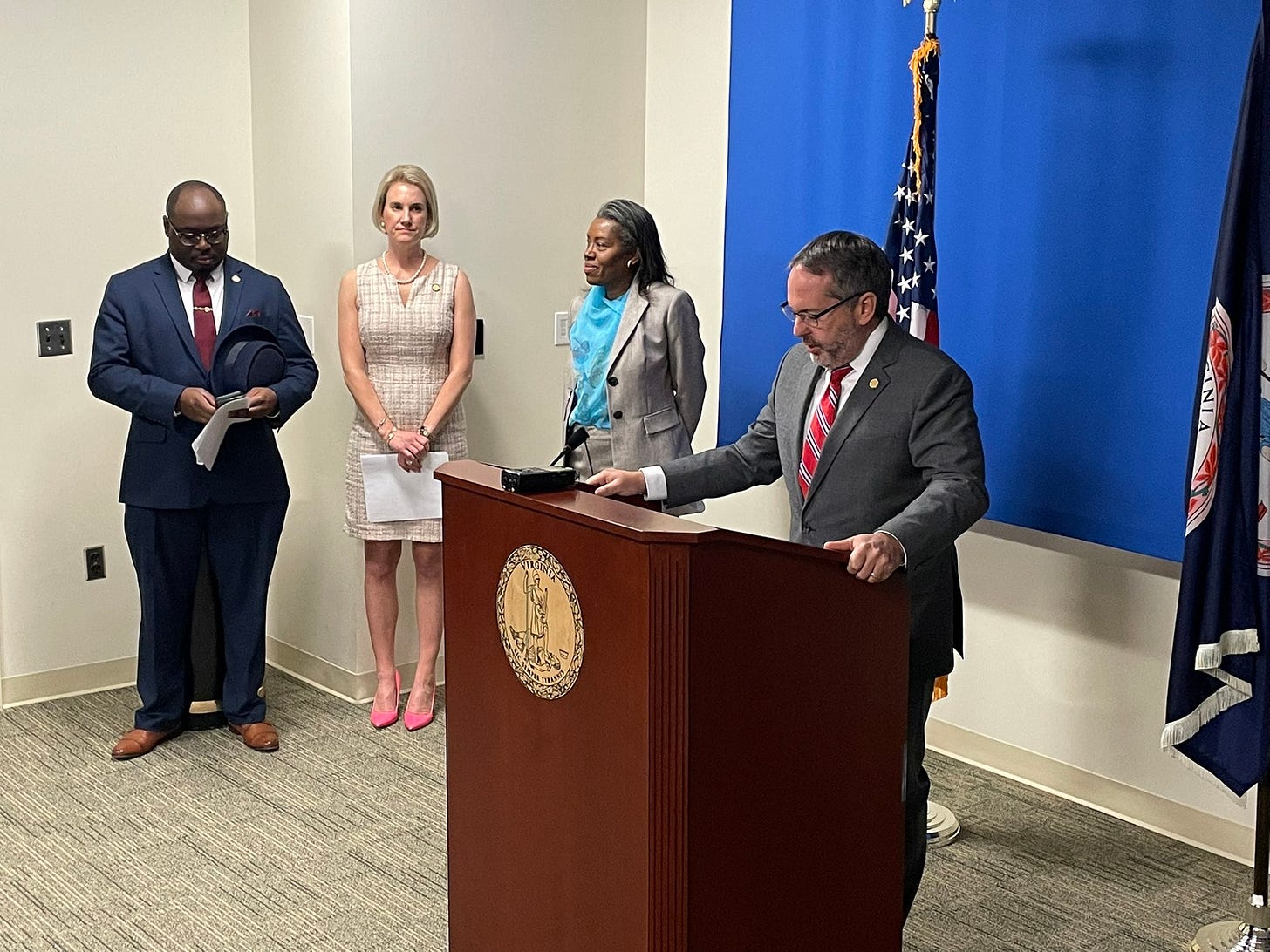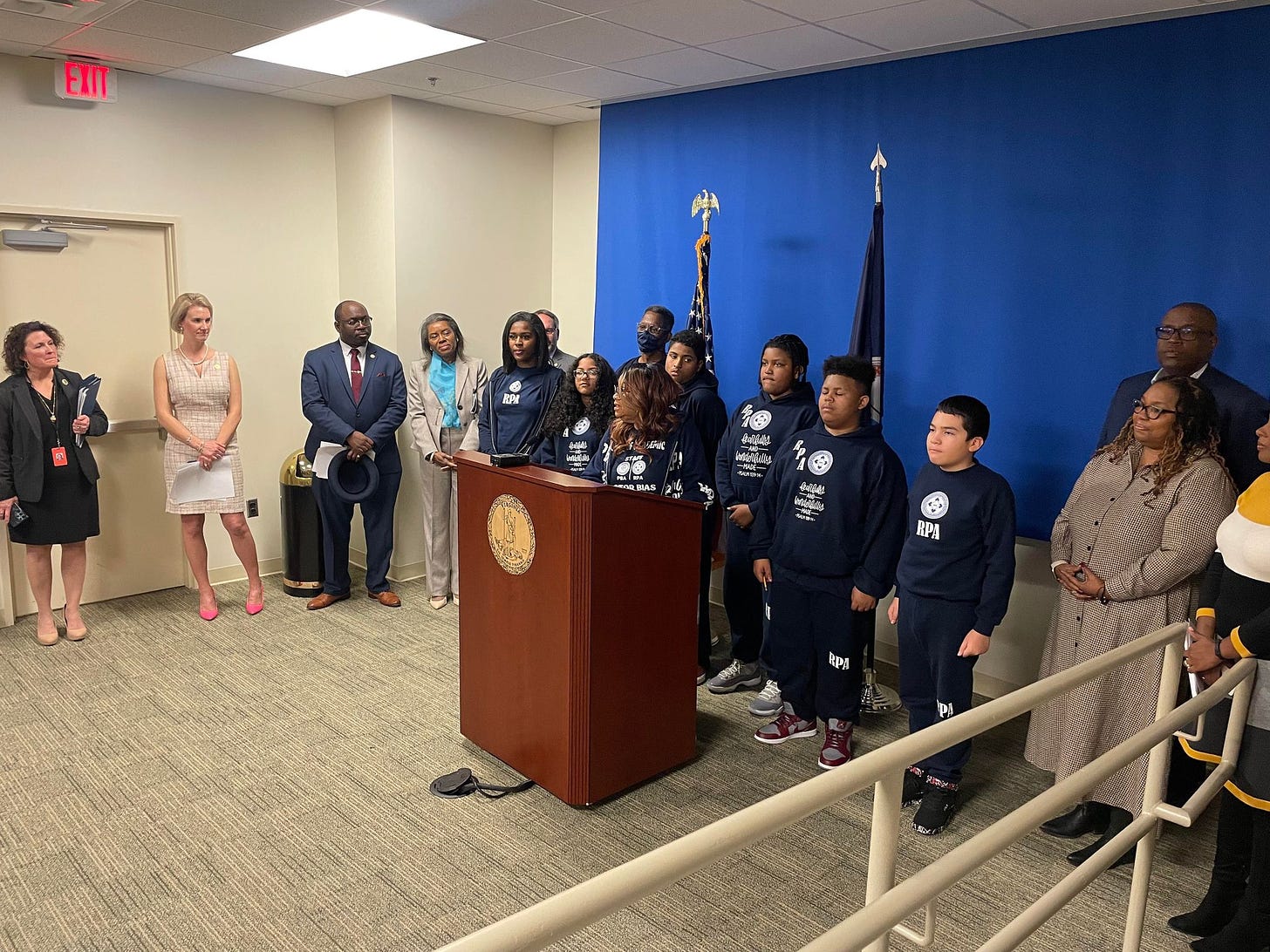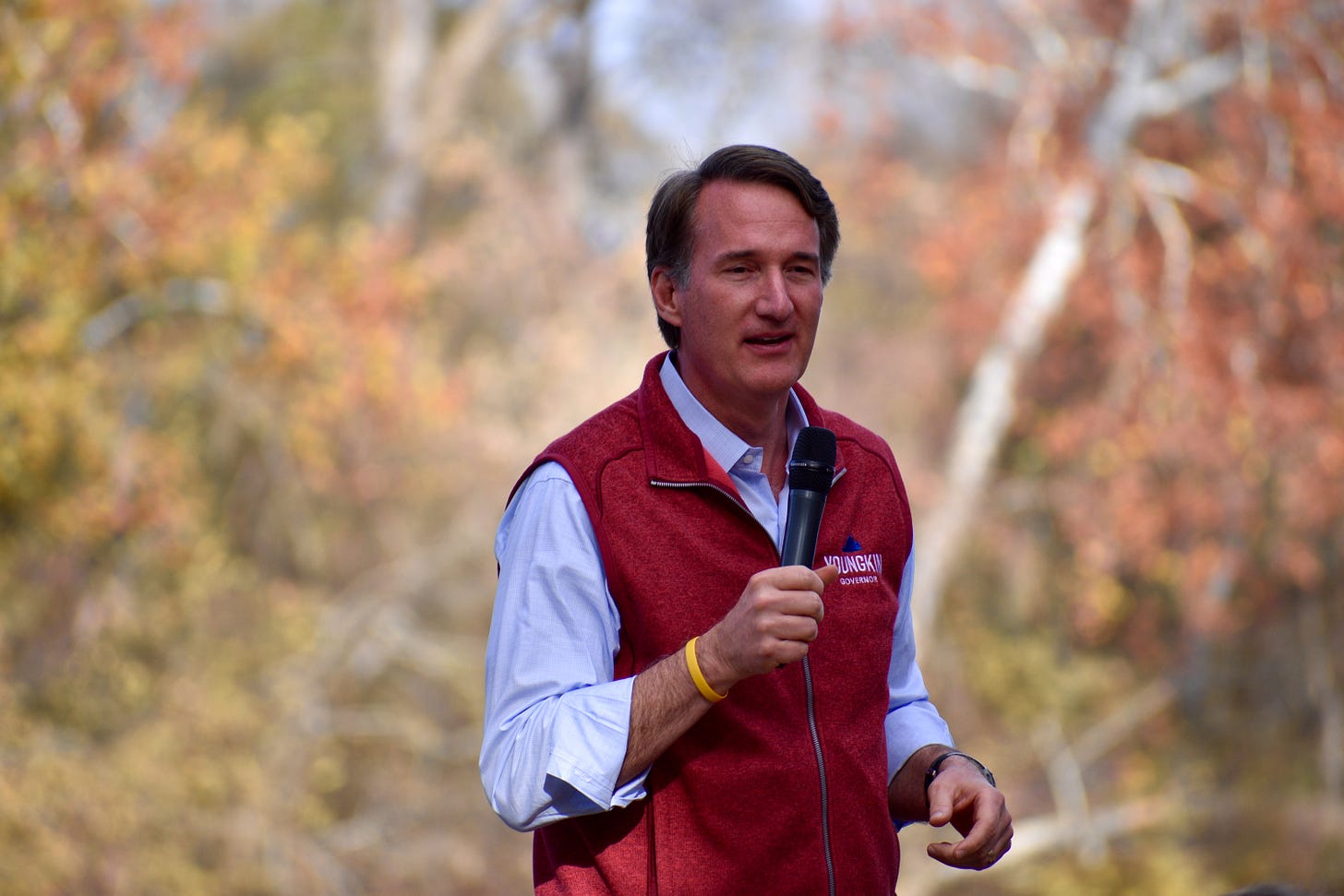Youngkin's approval is creeping up
Also, an awkward moment at the press conference with Winsome Earle-Sears and Glenn Davis.
This is a daily newsletter covering Virginia politics from top to bottom. Please consider becoming the ultimate political insider by supporting non-partisan, independent news and becoming a paid subscriber to this newsletter today.
Have a tip? You can reply to this email, or email me directly at Brandon@virginiascope.com
Davis and Earle-Sears push education savings accounts
Del. Glenn Davis (R) had Lieutenant Governor Winsome Earle-Sears as the headliner at a press conference Thursday to discuss his legislation that would create a savings account for students with a portion of the state funding initially allocated to their public school. Parents then would have the ability to choose and customize their child’s education.
Davis stressed that the money only comes from the state-funded portion of public schools and will not touch the local and federal funds.
Davis and Earle-Sears brought several community members to speak in favor of the legislation at the press conference.
One was the director of a private school for underprivileged students that charges $90 a week to teach the students. The director gave a passionate speech and she brought several students with her who stood on stage. Each of the students addressed the press conference by saying their name and what they plan to be when they grow up.
Things then became awkward when the director found out later during the press conference that the students who were in attendance would not be eligible for the funding if it becomes law due to the caveat that the student must have been in public school to apply for this savings account.
The school’s director called this development upsetting and asked for clarification, for which Davis and Earle-Sears tried to explain to her that the federal government is the reason for that requirement. (Still working to figure this part out.)
The director stopped asking questions but everyone in the room quickly realized that the group of kids who just spoke to the crowd and told them what they planned to use their education for will not actually be beneficiaries of this legislation if it becomes law.
There are also no safeguards for income requirements. Earle-Sears made a big push Thursday to say that this bill is not to help rich families but more the Black and Hispanic families that could not afford a quality education. However, there are no safeguards in the legislation at this time to prevent families that earn a high income from applying for the savings account program.
Davis believes that all the wealthy families interested in sending their students to private schools are already doing so and would not be interested in this savings account.
Davis also emphasized that the portion of money being taken from the state funding for each student participating is less than what it costs the school to educate one student due to only one-third of the funding being impacted by these savings accounts. He said Thursday that the school districts will lose the “overhead [cost] of that child, but they still get to keep two-thirds of funding.”
Democrats responded to the announcement from Davis and Earle-Sears:
“Public schools are a pillar of economic opportunity and growth, the strength of the middle class, and democracy,” said Del. Schuyler VanValkenburg, a public school teacher in Henrico. “Democrats want to fund public schools and build a strong middle class. Today, Republicans introduced a bill to defund public schools and send the money to the wealthy through vouchers. Henrico County and Virginia can’t afford the GOP education plan.”


“These are what are called back door vouchers,” said Rachel Levy, a public school teacher and Democratic candidate for the House of Delegates. “They subsidize the wealth of already affluent families and further defund and privatize our public schools. I oppose these handouts and I oppose defunding and privatizing our public schools.”
While this legislation will likely pass the Republican-held House of Delegates, the Democratic-held state Senate will be the challenge.
The legislative session begins next week.
What parents could use the money for:
(i) tuition, deposits, fees, or required textbooks for courses at a nonpublic school, associate-degree-granting public or private institution of higher education, or baccalaureate public or private institution of higher education in the Commonwealth; (ii) educational therapies or services for the qualified student from a practitioner or provider, including paraprofessionals, educational aides, and providers of occupational, behavioral, speech-language, and audiology therapies; (iii) tutoring services; (iv) curriculum; (v) tuition, textbooks, or fees for a private online learning program offered through an education service provider; (vi) fees for nationally standardized norm-referenced achievement tests, Advanced Placement examinations, or examinations taken to gain admission to an institution of higher education; (vii) services that are offered on a fee-for-service basis to the public by a public elementary school, secondary school, or specialized after-school or summer school education program, including classes and extracurricular activities but excluding after-school care; (viii) such insurance, surety bond payments, or fees as may be required for the savings account; (ix) transportation, provided that such expense does not exceed 20 percent of the total amount of the annual savings account disbursement; (x) computer hardware and software, connectivity devices, and Internet access, provided that such expense does not exceed 20 percent of the total amount of the annual savings account disbursement; (xi) school uniforms; and (xii) any other education-related goods or services, such as Internet access, that are necessary for the provision of the qualified student's education pursuant to § 22.1-254, provided that such other education-related expenses do not exceed 20 percent of the total amount of the annual savings account disbursement.


Youngkin’s approval rating
VCU’s Wilder School Commonwealth Poll revealed Gov. Glenn Youngkin’s approval rating on Thursday.
52% of respondents reported approving of Youngkin while 32% reported disapproval.
Virginians’ top priorities for legislators are addressing inflation and focusing on the future of democracy in the U.S. Inflation, 37% of respondents say, should be the primary focus of the legislative session, with Republicans, households with school-aged children and Hispanic individuals showing the strongest support for the issue. More than 1 in 5 respondents (21%) want the legislature to focus on the future of democracy in this country, with Democrats, households with an annual income of $70,000 or higher and families who do not have school-aged children in the house showing the strongest support.
More than half of respondents (53%) want to see Youngkin specifically intervene around the issues of inflation, education and crime during the convening of the 2023 General Assembly session. Of those wanting the governor to take action, a majority were African American (67%), Hispanic (66%) and between 18-34 years of age (65%).
The Commonwealth Poll obtained landline and mobile telephone interviews from Dec. 3 to Dec. 16, 2022, with a representative sample of 807 adults living in Virginia. It has a margin of error of 6.02%. Full results can be found at oppo.vcu.edu/policy-poll.
Criminal cases move forward against Loudoun schools officials - Washington Post
by Justin Jouvenal
A top Loudoun County schools official is facing a felony perjury charge for allegedly lying to a special grand jury about a pair of 2021 sexual assaults by a student, his attorney said Thursday.
Attorney Jennifer Leffler’s comments offer the first details about the allegations underlying the high-profile case. They came after a hearing during which a Loudoun County circuit judge set a June 20 jury trial for Wayde Byard. Leffler said her client, who is on administrative leave, will plead not guilty.
From last night: Still no Speaker








